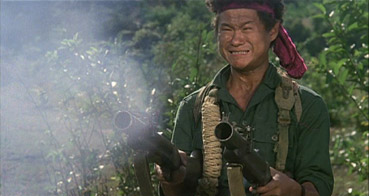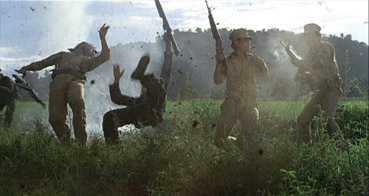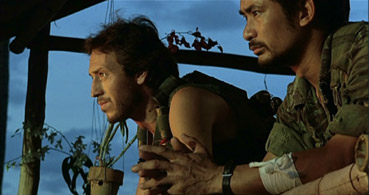|
There
are some minor spoilers in this review, so proceed with
caution
The
mark of a solid action movie, obviously, is that its action
sequences deliver the goods. The mark of a GREAT action
movie, I would argue, is that it delivers something more,
in character, in story, and perhaps even in subtext. Look at what in my humble view is the
greatest action film of them all, Kurosawa's Seven
Samurai – so beautifully developed are its plot
and characters that action is only one of many genres in
which it frequently finds itself a list-topper. The same
is true for later genre luminaries. I mean, the explosions
and gunfire were all very impressive in Die Hard,
but what what we really remember is Jim McClane, Hans Gruber,
Sergeant Al Powell, John McTiernan's sense of pace and narrative,
some lovely plot twists and a ream of quotable dialogue.
But
there is another category of action movie, the sort that Hollywood
is a bit too fond of making, where the characters
are so dislikeable, the plot so formulaic and the political
undercurrents so dubious that the best action in the world
is not going to put things right. Just about every discerning
film fan can draw up a list of titles that would fit this
description. I certainly can. My list is quite long, as it
happens, and growing by the month. I'm still haven't made
up my mind if Heroes Shed No Tears belongs
on it or not.

Just
knowing that it was directed by John Woo will find the film
champions even amongst those who have yet to see it. For
some, Woo is the king of modern action cinema, but for a
fair few, myself included, his crown slipped and eventually fell off once he made the move to
Hollywood. It's hard to put into words just how disappointed
I was by Hard Target, following on as it
did from the staggering set-pieces and character interplay
of The Killer and Hard Boiled.
Thus, the arrival on my doorstep of Heroes Shed No
Tears filled me with a sort of childlike optimism,
despite the stupid title. This is early classic era John
Woo, made immediately before A Better Tomorrow
began making waves well beyond his home soil.
The
scene in set in under a minute. Over maps and a series of
black-and-white stills, a voiceover tells us about the notorious
Golden Triangle on the border of Myanmar, Laos and Thailand,
the source for 75% of the world's illegal drugs. We are
informed that the operation is run by a General Sampton
and that the Thai government has vowed to grab him and smash
up the drug trade. To this end, an elite commando squad has
been formed, one made up of Chinese immigrants who have joined
up for a variety of reasons – some are idealists, other are in it for the money, while a fair few are doing it to get American green cards for their families. But, we are assured,
they all put their lives on the line and came together to
serve this mission. Thus our initial connection to the
squad is not through identification with the individuals
in it, but via the favourite movie logic that if drugs are
bad, then those producing them are evil and anyone who opposes
them by whatever means is automatically good. OK, it's an
action film, we'll roll with that for now.
Woo
dispenses with character establishment and plot preamble
to kick off the film with a bang. There's no Dirty
Dozen style recruitment and training-up here –
the first time we lay eyes on the squad they're already
at General Sampton's camp and ready to attack, and the moment
the opening credits conclude, they're off. In many respects, what follows is familiar action movie stuff – the commandos
have big weapons, shoot from the hip and kill twenty black-dressed
bad guys in a single sweep, while the heavily armed would-be
protectors of the multi-million dollar drug business flail
about, shoot wildly in the air and couldn't hit the side
of a barn with a cannon. There is a sense that Tony Montana and his "little
friend" could take this lot single handed. The action
itself is briskly shot and staged and the battles peppered
with slow motion and what would soon become Woo's signature two-handed gunfights,
first with pistols, then later with assault rifles and grenade
launchers. Weapon recoil never seems to be an issue.
It's
here that the first problems pop up for the audience members
who failed to leave their consciences at the door. Movie
convention may have hardened us to the results of gun battles,
but the slow motion shots of Black Gang members being burned
alive by a flame thrower are a different thing entirely – this is VERY early in the film to start sympathising with
the bad guys. Fortunately, Hong Kong action directors know
how to quickly re-establish their evil status. Cue the introduction
of commando leader Chan's devoted wife Julie, his sweetly
innocent young son Kyeong and his wise old father, whose
simple farmhouse is suddenly raided by the men in black.
Dad gets shot, the others are threatened, but Chan arrives
and sorts them out, and soon the commandos and their
prisoner have been joined by Chan's wife and son, the inevitable
weak links on their perilous journey to bring Sampton to
justice.

As
a set-up for subsequent action, this is familiar but solidly handled
stuff, a story of a band of warriors fighting their way
back to home base against the odds that harks all the way back
to the legends of Ancient Greece. But that's where the comparisons
end, the prime function of the plot here being to provide
a wobbly path from one action set piece to the next. If
that's what you came for then you'll get it – the bullet
and explosion count is very high and the fire fights sometimes
spectacularly staged. The John Woo that was soon to
make A Better Tomorrow can clearly be seen
here fine-tuning his craft.
The
problem, perhaps unsurprisingly, is character development,
of which there is precious little. The one-dimensional and
ruthlessly evil villains will come as no surprise to those
with a grounding in Hong Kong action cinema – what is unexpected
is that Chan's platoon come across as being almost as bad. Take the dice-addicted
Chin, for example, who is happy to gamble with a local tribal
chief and relinquish him of valuable religious relics, but
when the chief reacts by threatening Chin's life, Chin escapes
by blowing the man and his companions to smithereens and
cracking a joke. Then there's his grinny friend Chau,
who's clearly only joined up for the money and at one point ups his pay by stripping the bodies of the fallen of their personal possessions. Yet when a man he mistakes for dead refuses
to give up his gold teeth and bites Chin's fingers, Chin
responds by blowing his brains out. When he gets fatally speared to bits
a few minutes later, I couldn't help thinking he'd asked
for it – any suspicion that Woo shared my moral complication
is quickly dispelled by the weepily sentimental funeral
service that follows.
Collectively,
the platoon tend to shoot first and not ask questions
later and are prepared to kill anything that makes even a single move against
them. To up the stakes a little, a second collection of bad guys is then introduced, one
led by a particularly nasty military officer who wears dark glasses, makes a ritual
of dressing, and shoots people without
a flicker of emotion. When he gets an eye shot out by Chan
while the commandos are rescuing a very girlie French reporter
whose driver and companion have been killed, he goes after
Chan and his boys (and girls) with snarling zeal. To prove
how ruthless he is, he has a couple of members of a local
tribe strung up and shot to pieces, threatening dire consequences
for the rest of them if they do not attack Chan's commandos.
For the first time I felt real sympathy with some of the film's character – the local people live a simple existence and have
no interest in this conflict but have been forced to participate
to protect the lives of their families. The commandos know
nothing of this and don't waste time investigating – when
the tribesmen attack, they just wipe them out.
It
was at this point that I began seriously wondering if I
wanted Chan and his boys to succeed, in part because they
never present a recognisably human side to their cartoonish
action man personas. Clunky attempts at character comedy
involving Chin and Chau probably play better on home soil,
and having Chan look lovingly at his wife of son every now
and again does not make him a closet humanitarian. Even
the most potentially interesting character, an American
deserter who once saved Chan's life and has chosen not to
return home, flips over into cliché before his story ends, getting to scream an impassioned "NOOOOOOOO!!!"
when one of his girlfriends is killed by enemy fire. As
the action intensifies, the implausibility factor increases,
culminating in a grisly scene in which a character is shot,
has his eyes sewn open and is hung in the air with a pole
wedged in his behind for three hours, an ordeal from which
he somehow emerges with his vision intact and his body in fighting
fit shape.

But
amoral hard men and violence often go hand-in-hand in action
cinema and especially what has become known as the 'heroic
bloodshed' subgenre, which Woo was instrumental in giving birth to. For many, it's all about what happens
when the guns and grenades go off, and there is plenty to
keep your eyes and ears (if not your brain) occupied here.
If the action tends to get a bit repetitive by the end –
just how many people can you see shot up before you become
indifferent to it? – there are still moments throughout
where the brutal and the balletic meld with an almost Peckinpah-like
perfection. It's a fair way short of the cinematically dazzling
gunplay of The Killer and Hard
Boiled, but it's a recognisable and assured step
in that direction, and is still better than the messy excesses
of Woo's later Hollywood work.
It
should be noted that the drugged-up sex scenes were added
at the insistence of the studio, who then heavily recut
the film before its release, and this is the version
featured here. As yet, no director's cut has made an appearance.
Hong
Kong Legends have delivered again, delivering a solid transfer
from a new, high definition master which itself has been
created from a first class print. The contrast is occasionally
a tad harsh, but on the whole the picture, especially for
a mid-1980s Hong Kong film, is very impressive. The odd
dust spots are visible, but are rare. The only distraction
comes in the form of what looks like edge enhancement, resulting
in some visible halos on objects when seen against single
colour backgrounds (skies, etc.). Mind you, the speed of
the editing doesn't give you much chance to see it. The
framing is 1.85:1 and the picture is anamorphically enhanced.
Three soundtracks are on offer. The original Dolby 2.0 Cantonese
mono, a 5.1 remix of the same, and a 5.1 English dub. The
mono is a little tinny and really lacks punch, leaving the
way clear for the 5.1 mix to show its stuff. The clarity,
dynamic range and bass are all far superior to the mono
mix, and separation is well done, at least at the front
– there's not a huge amount going on behind. The
English dub is identical to the Cantonese 5.1 in sound quality,
and it all comes down to personal preference. As usual lines
are changed to suit mouth movements or the whims of the
voice artists, sometimes altering the thrust of the dialogue.
Thus "No big deal, decapitation – it happens all the
time" becomes "Executions – barbarians!"
The
UK Promotional Trailer (1:00)
is the standard HKL DVD release promo, while the Original
Theatrical Trailer (3:56) is actually a part
of dual promo for this and A Better Tomorrow
– we only get the Heroes Shed No Tears
bit here.
From
Hong Kong to Hollywood: An Interview with John Woo
(22:49) is both more and less than that title suggests.
The interview itself is certainly shorter than I'd expected,
and a couple of extracts from the main feature run for minutes
at a time, but Woo's early film career is covered in some
detail, and includes stills and extracts from key early
works. There is also a very brief interview with Peter Pau,
cinematographer on The Killer, and a longer, though
not that substantial one with one of Woo's favourite actors,
Chow Yun Fat.
A
Tribute to Lam Ching-Ying (7:01) is a very
detailed, set-to-music textual biography of the actor who
plays the evil military officer in this film and died in
1997 of cancer at the ludicrously young age of 45.
If
you're a hardcore John Woo devotee you'll probably have bought
the disc the moment it hit the shelves. If you're already
a fan of the film and have been holding off until you check
out the picture and sound quality, then go ahead and buy,
as there are no problems there. For everyone else, well
it will depend on whether the action alone is enough to
sell it to you. If you want your brain to get as much of
a workout as your adrenal gland, you may not find what you're
looking for here.
|